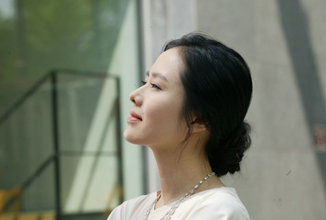"The sun never existed in my life. All I had was a thin ray of light. It wasn't as bright as the sun, but it was bright enough."
Synopsis:
Police investigating the murder of a pawnbroker, who has been found strangled and hanged, discover what appears to be a link to the death of another man fourteen years earlier. The detective who was in charge of the original case (Detective Han Dong-soo - played by Han Suk-kyu) is brought back in to investigate, still certain in his belief that the son of the original victim and the daughter of the supposed murderer were (and are) somehow involved in the crime(s), and are secretly linked to each other. As he sets out to solve both cases before the statute of limitations expires on the initial murder, further bodies begin to pile up and, with time quickly running out, he faces a desperate race to separate the truth from the lies in a case where black and white are, in reality, differing shades of the same colour…
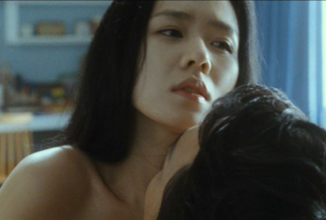 |
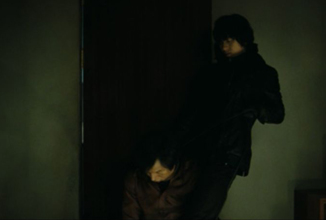 |
Review:
The utterly ravishing opening scenes in White Night immediately paint quite a detailed picture of the two main suspects (of their current lives and respective places within the world) and also give tantalising indications of some of the major themes present within the film:
Tchaikovsky's Swan Lake begins to play, as a black screen slowly fades into a scene showing a beautiful young woman - whom we later learn is Mi-ho (Son Ye-jin) - making love to a man in a sumptuous, meticulously clean, bright room, filled with sunlight streaming in through the windows. Though she is clearly in the throes of passion, there is no hiding the sorrow written all over her face, or the underlying feeling that at least part of her is desperate to escape the situation and run away, screaming. As the beautiful, yet equally dark, score breaks into full orchestration, the scene jumps to show a man being brutally, and graphically, murdered in a dark and dingy house filled with shadows - by a character whom we soon discover is Yo-han (Go Soo) - and as the music reaches a crescendo, the two scenes successively play against each other, concluding with Mi-ho sitting, curled up in bed, clutching herself, with her head forlornly resting on her knees; juxtaposed with an image of Yo-han, completely motionless, staring emptily into the camera.
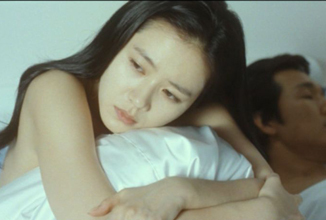 |
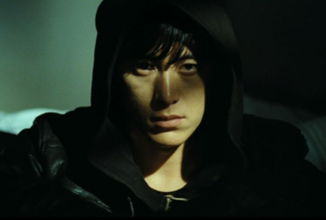 |
Having already clearly seen the murderer in action this early on, it's pretty obvious that White Night is not a simple "whodunit" - the film is much more concerned with the motivations of each of the main characters, and this analysis of why they each do the things they do repeatedly references the ongoing themes throughout.
Every scene in which we see Mi-ho, is bathed in light - almost overly bright and verging on slightly unreal - and, combined with her regularly occurring (and deliberately fake) smile, speaks volumes about a woman desperately trying to hide behind an outwardly warm, sunny demeanor.
By contrast, Yo-han is always shown in shadow, staring at a bright world from a claustrophobically blinkered perspective, and watching Mi-ho from a distance in exactly the same way as he views the sun. This contrast in the levels of light personifying the two characters' ongoing lives essentially sums up their present-day symbiotic relationship: Mi-ho, though her life is outwardly bright and serene, lives with shadows lurking below the surface - personified by Yo-han's character; and Yo-han lives submerged in a dark world of shadows and vicious deeds - his actions allowing Mi-ho to walk in the sun.
Even more than that, Mi-ho actually represents the sun to him (especially prevalent in the penultimate scene in the film, when she is seen "ascending" with an increasing brightness - as Yo-han himself says "You know, when the sun is at its highest point, the shadows disappear" - a quote which actually has two meanings) and his yearning for a future walking in the sun without fear of the shadows of the past, is in reality a desire for a life with her, basking in her light.
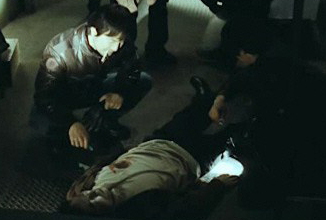 |
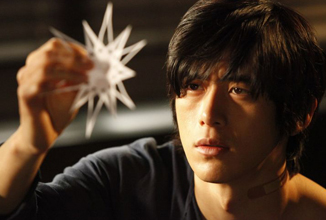 |
However, White Night is (thankfully) not content to simply use metaphors and analogies (dark vs. bright, black vs. white) to discuss the underlying themes and commentaries, and delves much more deeply into proceedings to expertly weave an emotional tapestry which is as beautifully conceived, and equally as complex, as the film itself:
Increasingly, the characters whose lives intersect with those of Mi-ho and Yo-han, are forced to face both personal issues and psychological scars resulting from those interactions; some being simply inadvertent, others deliberately caused by the two protagonists (most notably Young-eun (Hong Ji-hee), the daughter of Mi-ho’s boyfriend, in what is without doubt the most emotionally warped plot development in the entire story - "You've become the young me of the past. Poor thing..."), but even they come to understand that nothing here is as simple as it first appears, nor as straightforward as black or white.
As we begin to learn the full extent of the actions and pasts of Mi-ho and Yo-han, both the audience and the other characters are successively drawn to view one of them in a sympathetic light and the other as less empathy-worthy, only to have those feelings completely switched around just moments later. Even Detective Han is shown to share these shifting feelings of pity/sympathy - at least partly as a result of first meeting the two characters when they were children of approximately the same age as the son whom he misses so much.
Regardless of whether our empathy is being placed, at any given time, with Mi-ho or Yo-han, the twisted emotions created from feeling sympathy for murderers, manipulators, or victims of crime who have subsequently become its perpetrators, remain - and it is up to each individual viewer to settle those within their own mind.
When all is said and done, even though it is clear that the lives of Mi-ho and Yo-han are, currently, utterly different, it is equally obvious that neither has been dealt a happy lot in life, and that neither one of them is complete without the other ("They are like Siamese twins who can't live without each other, no matter how painful it is") and, ultimately, it can't be denied that both are tragic figures who are (despite their ill-chosen actions and choices subsequent to, and because of, the dark issues in their pasts) victims of a fate over which they really had, and still have, no control. That fate is also set to lead them both to discover that it is impossible to escape the shadows of the past without paying a costly price.
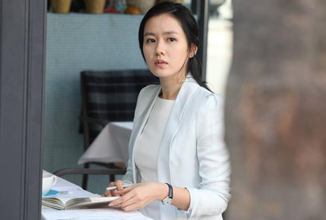 |
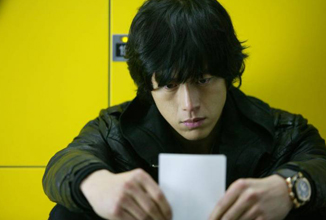 |
Direction:
Cinematically, White Night (which is based on the Japanese novel "Byakuyako", by Keigo Higashino) is simply stunning and it is difficult to believe that this is Park Shin-woo's first directorial full-length feature. The imagery is sumptuously beautiful (even when horrific scenes are being played onscreen) with near-perfect pacing throughout and, though White Night is a long film (135 minutes in duration), at no point does the story either drag or rush in any respect.
The musical score lifts the level of proceedings still further, bringing to mind the use of musical pieces in Park Chan-wook epics (in fact, White Night’s musical director, Jo Yeong-wook, also provided the music for Oldboy) and the cinematography and soundtrack compliment each other at every turn - equally influencing viewers' perception of the beauty, horror, or heartbreak of what they are seeing, and hearing.
As a final note, certain stylistic elements within White Night, both in direction and camerawork, are clearly influenced by several renowned filmmakers (most notably Hitchcock) and, though this is to be expected in any work from a first-time feature director, Park Shin-woo never overplays them in any respect - using them only in situations where they are a boon to the overall feel of proceedings - and melds each so perfectly with surrounding scenes that they never feel contrived, and instead serve to add yet more style to substance.
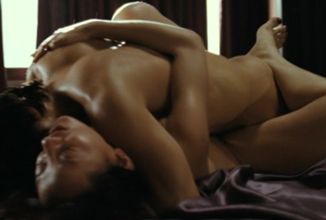 |
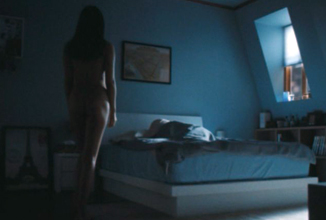 |
Cast:
The roles of Mi-ho, Yo-han and Detective Han are by far the most involved and important within White Night and the portayal of each is exemplary:
Son Ye-jin (as Mi-ho in adulthood) gives, as she has in so many of her previous films, a note-perfect portrayal which makes great use of her incredible emotional range. Early in the film (aside from the very first scene), viewers could be forgiven for thinking that Mi-ho is going to be a rather one-dimensional character (required only to smile sweetly at every opportunity), but watching the scene featuring Mi-ho and her boyfriend's daughter, in Mi-ho's car, will instantly make those with that misconception rethink every one of Mi-ho's previous smiles and find a plethora of emotions present in each. Son Ye-jin is one of the most famous South Korean actresses and her performance in White Night, yet again, shows that she is also one of the most talented.
Go Soo (as Yo-han in adulthood) also gives an impassioned, utterly believable performance and, in one fell swoop, manages to shake off the "good guy" tag of his previous roles. He brings a noticeable vulnerability to his character and most of the empathy elicited - as much as can be, for a man such as Yo-han - is largely due to his portrayal.
Han Suk-kyu (as Detective Han) has played a lot of policeman in his career, but it must be said that that is, quite possibly, because he is so good at it. Detective Han has a lot of the standard, cop down on his luck and beaten down by life, elements but also has more depth that many of these types of roles and Han Suk-kyu's portrayal is a reminder of why he has had such a long and successful career.
The roles of Yo-han and Mi-ho as children (played by Joo Da-yeong and Won Deok-hyeon, respectively) *note that Mi-ho used a different name in her youth* are significantly smaller, but nonetheless important and, once again, the portrayals are right on the mark throughout.
Finally Park Seong-woong (as Mi-ho's boyfriend, Seong-ju) and Lee Min-jeong (as his assistant, Si-young) take on very much supporting roles, even though they both appear in numerous scenes, but bring as much depth to their characters as is possible.
Summary:
White Night is an utterly superlative film which repeatedly reminds fans of Korean films of the reasons they fell in love with South Korean cinema in the first place. Film of the year!
Cast (Actor...
Character):
Son Ye-jin... Mi-ho
Go Soo... Yo-han
Han Suk-kyu... Detective Han
Park Seong-woong... Seong-ju
Lee Min-jeong... Si-young
Hong Ji-hee... Young-eun
Joo Da-yeong... Jia
Won Deok-hyeon... Yo-han (as a child)
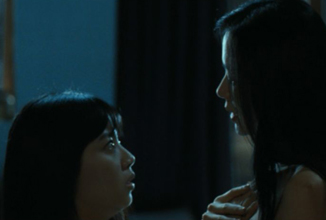 |
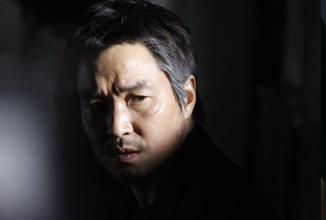 |
DVD
The DVD
edition reviewed here is the Korean (Region 3) Art Service Special Edition 2-Disc release, which comes in matt-finished deluxe packaging with stunning artwork both inside and out. The film itself is
provided as an anamorphic transfer with an aspect ratio of 2.35:1 and there are no image artifacts (and no ghosting) present. Not only does the
picture remains consistently sharp and beautifully rich, with great depth of field throughout, but colours are truly sumptuous - to such an extent that bright scenes take on an ethereal quality and darker segments are noticeably, and beautifully, silky. In fact, every image on the screen positively screams that this really is a quality release.
The original Korean
language soundtrack is provided as a choice of Dolby Digital 5.1 and Dolby Digital 2.0 and is, quite possibly, the best sound that I have heard on a DVD in quite some time. The classical score is well balanced, without being overpowering, and the quieter scenes are so nuanced that you can actually hear the sound of tobacco and paper "fizzling" as a cigarette is lit.
Excellent subtitles are provided
throughout the main feature but English-speaking viewers should note that, as with many Korean DVD releases, there are no subtitles available on any of the extras. However, the special features (especially the audio commentary and Making Of featurette) are, yet again, of such a high quality (and so informative) that it may almost be worth you considering learning Korean simply to be able to appreciate them.
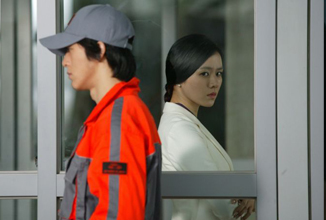 |
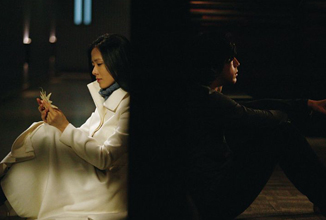 |
DVD
Details:
• Director: Park Shin-woo
• Format: NTSC,
Anamorphic, Widescreen, Subtitled
• Language: Korean
•
Subtitles: English/Korean
•
Sound: Dolby Digital 5.1, Dolby Digital 2.0
• Region: Region 3
• Aspect Ratio:
2.35:1
• Number of discs: 2
• Classification: Category II (Korean Film Classification)
• Studio:
Art Service
• Run Time: 135 minutes (approx.)
DVD Extras:
- Audio commentary - featuring members of the cast and crew (135 mins)
- Making Of - including cast and crew interviews (50 mins)
- Art direction featurette (30 mins)
- Deleted scenes
- A short film by Park Shin-woo
- Music video
- Trailers
|
















